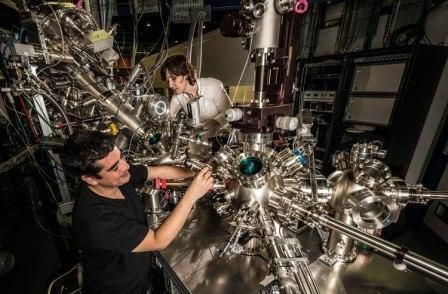
05/11/2014
New catalysts investigated with the ALBA Synchrotron
New catalysts investigated with the ALBA Synchrotron
A group of researchers, led by UPC university in Barcelona, which works on catalysts, has discovered that atoms react differently depending on the characteristics of the support that is used. Part of this study, which has been published on October 31 in the famous Science Magazine, was performed at the CIRCE beamline of ALBA Synchrotron.
The study is an important step forward in the design of new catalysts with applications in the field of energy: the catalyst investigated by the researchers contains metal (rhodium and palladium) nanoparticles and is very effective at producing hydrogen, a product that could replace fossil fuels and contribute to the energy transition.
News based on the press release issued by ALBA Synchrotron.
Image: ALBA Synchroton - Researchers Virginia Pérez-Dieste and Carlos Escudero at NAPP endstation of CIRCE beamline of ALBA Synchrotron
The study is an important step forward in the design of new catalysts with applications in the field of energy: the catalyst investigated by the researchers contains metal (rhodium and palladium) nanoparticles and is very effective at producing hydrogen, a product that could replace fossil fuels and contribute to the energy transition.
News based on the press release issued by ALBA Synchrotron.
Image: ALBA Synchroton - Researchers Virginia Pérez-Dieste and Carlos Escudero at NAPP endstation of CIRCE beamline of ALBA Synchrotron
More news
14/12/2018
The Open Innovation Forum matches business challenges to academic solutions
07/12/2018
2017 BioCat report: The best of the Bioregion of Catalonia
30/11/2018
Barcelona Synchrotron Park’s Commitment to Sustainable Growth
23/11/2018
Astronomers led by IEEC reveal a cold super-Earth around Barnard’s star
16/11/2018
CRAG’s Researchers discover how to generate plants with enhanced drought resistance
08/11/2018
The Barcelona manifesto: for a city-led science and technology diplomacy









